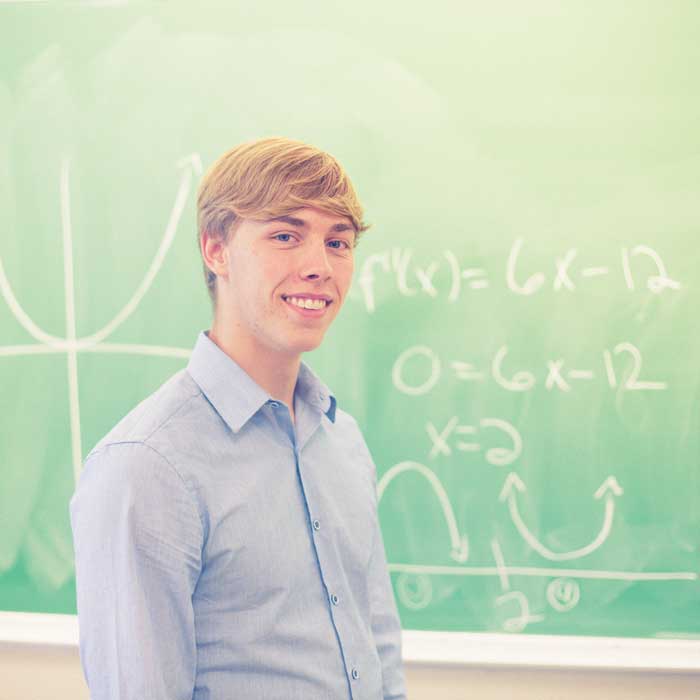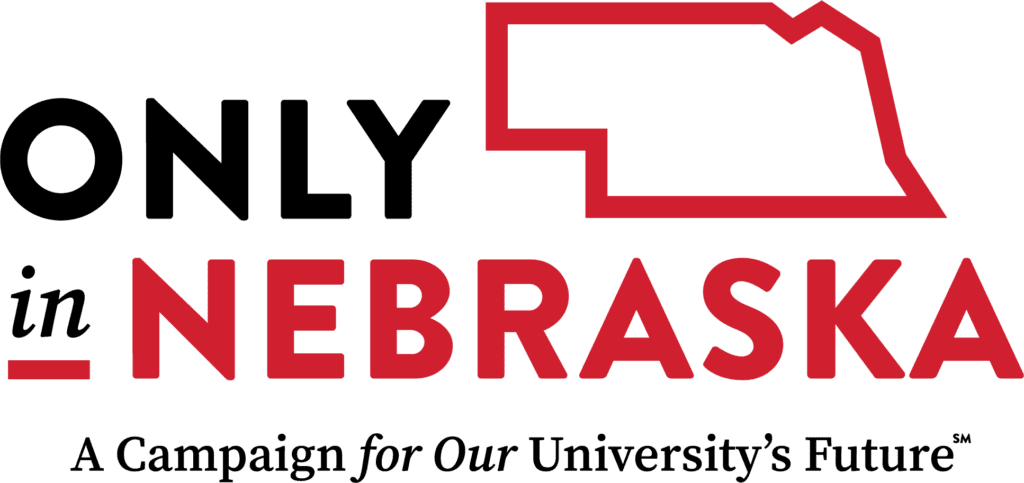Confidence STEMS from hands-on learning


Confidence STEMS from hands-on learning
UNO students see the excitement for STEM areas growing, thanks to community chairs.
Many moments of…Eureka!
That’s what you’d see looking through the eyes of three bright students at UNO.
Dylan, Tyler and Katie.
The three study in areas of STEM (science, technology, engineering and math). Through their eyes, you’d see:
A young man failing Calc. II but then turning it around, thanks to an innovative way of learning, and now loving Calc. III.
A middle-school girl from a disadvantaged area who, after touring the new anatomy lab, now is considering UNO on her way to becoming a doctor. (You’d see lots of talented girls like her who come to UNO each summer for the hand-on EUREKA!-STEM enrichment camp, and who now see themselves in STEM careers.)
A STEM community growing on campus and stemming out into Omaha, thanks to a star team of professors — the four STEM community chairs — who are leading the way.
“I think it’s cool that we’re getting out to everyone, not just the privileged few,” says junior Dylan King, a math major and learning assistant for his mentor, Angie Hodge, Ph.D., who hold the Dr. George Haddix Community Chair in Mathematics in the College of Arts & Sciences.
“One of the coolest things I’ve seen was when I was working in the summer with the girls in the EUREKA!-STEM camp,” he says, “Some of those girls were so smart that they could be teaching at the college level someday. But I could also see them never going down that road at all and reaching their full potential because no one showed them the road. That is on us. That is on every one of us in the community.
“And that is why it’s great we have these community chairs helping out in the community.”
Besides Dr. Hodge, UNO’s STEM chairs are Neal Grandgenett, Ph.D., who holds the Dr. George and Sally Haddix Community Chair of STEM Education in the College of Education; Brian Dorn, Ph.D., who holds the Union Pacific Community Chair of Computer Science Education in the College of Information Science & Technology; and Christine Cutucache, Ph.D., who holds the Haddix Community Chair in Science in the College of Arts & Sciences.
The four build relationships among faculty members of all backgrounds while also building bridges between UNO and partners in the community.
The four inspire their students.
Tyler Herek graduated summa cum laude from UNO in 2014 and is now working on his master’s degree in biology. He recently won the most coveted award a grad student researcher can win — a National Science Foundation Graduate Research Fellowship.
He works in Dr. Cutucache’s lab. He credits “Dr. C” and the whole STEM initiative for helping him achieve that dream.
“I was here before the community chairs, and then right as they were forming,” Tyler says. “I’ve seen how the community chairs have brought a lot of cohesiveness. I worked closely with Dr. C as soon as she was given her chair, and I saw her work closely with Dr. Grandgenett and the others to put STEM on the map. I’ve worked with Dr. Dorn on the south campus.
“There’s a real sense that UNO is really driving its niche home on this—really focusing on what it wants to do and accomplishing it.”
Tyler participates in a pre-professional training program for UNO students called NE STEM 4U. The program focuses on teaching, research and mentorship while providing high-quality, hands-on experiments for disadvantaged kids during after-school programs. NE STEM 4U has offered its informal after-school programming to more than 2,000 kids in the Omaha Public School system. The program is in eight OPS elementary and middle schools twice per week.
“What we try to do is to let the kids know that college can be for them,” Tyler says. “We’re trying to bring that excitement to them in a more relaxed after-school setting. That means a lot to me because we can open their eyes to see that science is not just boring memorization.”
On campus, Dylan has seen the Math Club grow.
“There’s a quickly developing mathematics community that was not in existence,” he says. “I’ve seen it just in my three years — it’s increased so much.”
Dr. Hodge’s goal is to help make UNO a nationwide leader and role model for innovation in math education. She is helping transform the classroom atmosphere through inquiry-based learning (IBL), which means engaging students as much as possible in problem-solving activities.
You won’t see her calculus students sitting quietly in rows. They’re talking, asking questions and teaching one another. You won’t often see her lecturing in front of her classroom. She instead gives her students tasks that require them to solve problems, explore and communicate. Once students “own” their learning experiences, they understand mathematics in a much deeper way.
At first, Dylan thought IBL was “a little weird.”
“I didn’t realize how much IBL was helping me until that first test, and I got an A on it,” he says. “But through IBL you interact, you listen, you absorb, and when the test comes—wow! You realize, ‘I actually do know this stuff.’”
Now he sees the other side of it in his role as Dr. Hodge’s learning assistant.
One recent day, Dylan ran into a young man he’d tutored through Calc. II class last year. The young man had struggled at first, but he eventually got it.
Eureka!
“I met him by the fountain the other day. He says he went on to Calc. III. He goes, ‘Hey, I couldn’t have done this without you guys. Thanks so much.’ That was really a cool moment for me—and for the system.
“We helped him to believe he could succeed, and I could just see it in his eyes—he knew he could pass that class. When I had started with him, he didn’t have that.”
Katie Wanek didn’t have that, either, when she started at UNO.
She’s a senior now with a double major in secondary education and math. She plans to teach math somewhere in the Omaha area. If you’d have told her that a few years ago, she wouldn’t have believed it. She thought she was bad at math. She didn’t like it. It frustrated her.
But then she took Dr. Hodge’s Calc. I class her freshman year.
It was Dr. Hodge’s first year at UNO, too. Katie watched her walk into class that first day—young and energetic and female—and figured she was just another student.
Dr. Hodge saw her potential.
“She was like, ‘Katie, you’re good at math! Come on!”
Katie went on to Calc. II and, over time, experienced math in a different way. One day to her surprise she realized her math homework had become her favorite homework.
She went on to become president of the Math Club for three years and is now student advisor for it. She’s helping open the eyes of young girls in the community through the EUREKA!-STEM camp and other outreach programs.
She’s telling them that they’re good at math, too.
“I actually found an old Calc. II test a couple of weeks ago and I sent a picture of it to Dr. Hodge and said, ‘Oh, do you remember this?” She had written on the top of it: Now do you see you’re good in math?
Dylan, Tyler and Katie have seen first-hand how hands-on learning builds confidence.
The three have seen how the STEM community chairs have helped awareness grow. A few other examples:
The Math Teachers’ Circle. UNO hosts a monthly event for area math teachers, who learn inquiry-based mathematics from UNO professors from other universities.
The program called SPARCS (Strategic Problem-based Approach to Rouse Computer Science). This new program is a National Science Foundation-funded initiative that trains middle-school teachers to integrate computational thinking into core content areas. Dr. Dorn and Dr. Grandgenett are co-principal investigators on this grant (along with other UNO Computer Science faculty).
UNO is a national model in preparing teachers in STEM areas and in providing a variety of options in the paths that students can take to becoming STEM educators. For example, UNO students can get a STEM-discipline degree as well as a College of Education degree in achieving teacher certification, or if they already have a degree, they can be part of the Teacher Academy Program—a graduate program that lets student with a STEM bachelor’s degree become a certified teacher.
And Dylan, Tyler and Katie have seen themselves grow in ways they never would have imagined a few years ago.
Eureka!
“It’s very inspirational to be around Dr. Hodge,” Dylan says. “I’m very blessed to have this position (as her assistant). I’m developing so much. I’d probably do it for free.”
He laughs.
“But don’t tell anyone that.”
Dylan, Tyler and Katie are examples of how the University of Nebraska’s Our Students, Our Future fundraising initiative will help make better futures for us all. The two-year, $200 million initiative runs through 2017.
If you would like to help promising students like them, please contact the University of Nebraska Foundation at 800-432-3216.





